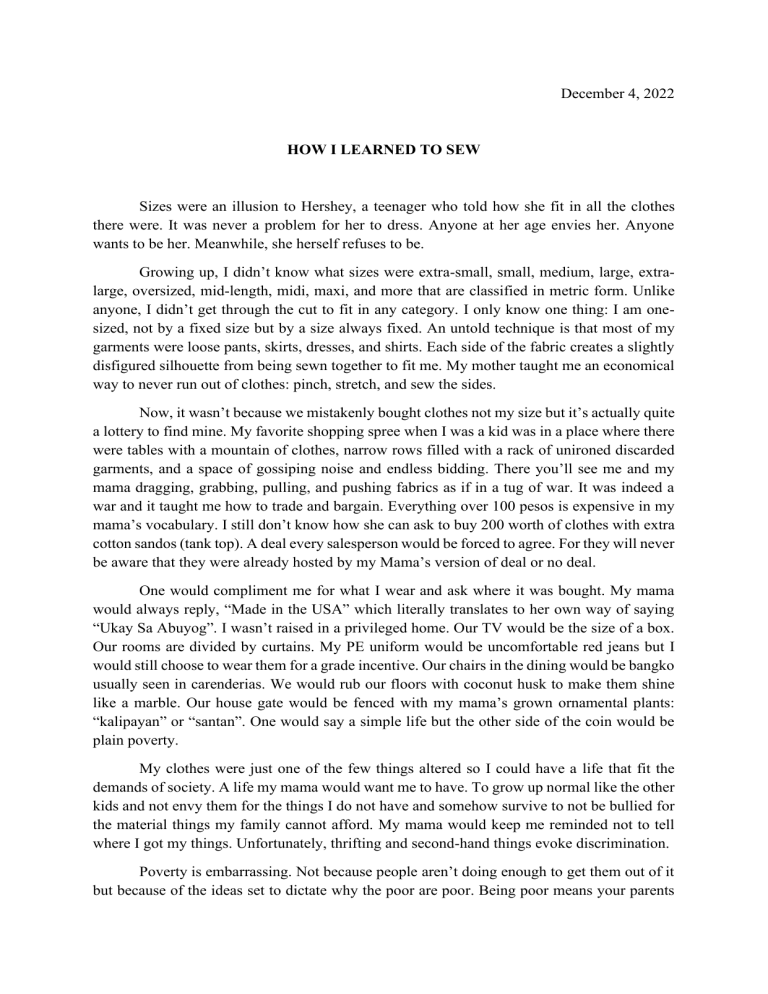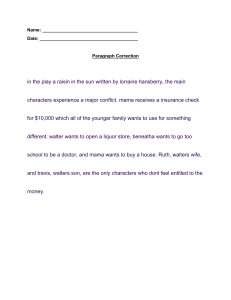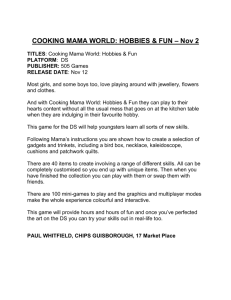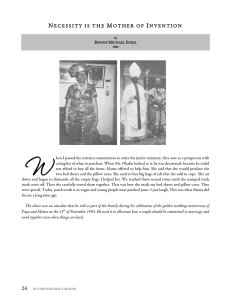Thrifting & Identity: A Personal Essay on Sewing and Society
advertisement

December 4, 2022 HOW I LEARNED TO SEW Sizes were an illusion to Hershey, a teenager who told how she fit in all the clothes there were. It was never a problem for her to dress. Anyone at her age envies her. Anyone wants to be her. Meanwhile, she herself refuses to be. Growing up, I didn’t know what sizes were extra-small, small, medium, large, extralarge, oversized, mid-length, midi, maxi, and more that are classified in metric form. Unlike anyone, I didn’t get through the cut to fit in any category. I only know one thing: I am onesized, not by a fixed size but by a size always fixed. An untold technique is that most of my garments were loose pants, skirts, dresses, and shirts. Each side of the fabric creates a slightly disfigured silhouette from being sewn together to fit me. My mother taught me an economical way to never run out of clothes: pinch, stretch, and sew the sides. Now, it wasn’t because we mistakenly bought clothes not my size but it’s actually quite a lottery to find mine. My favorite shopping spree when I was a kid was in a place where there were tables with a mountain of clothes, narrow rows filled with a rack of unironed discarded garments, and a space of gossiping noise and endless bidding. There you’ll see me and my mama dragging, grabbing, pulling, and pushing fabrics as if in a tug of war. It was indeed a war and it taught me how to trade and bargain. Everything over 100 pesos is expensive in my mama’s vocabulary. I still don’t know how she can ask to buy 200 worth of clothes with extra cotton sandos (tank top). A deal every salesperson would be forced to agree. For they will never be aware that they were already hosted by my Mama’s version of deal or no deal. One would compliment me for what I wear and ask where it was bought. My mama would always reply, “Made in the USA” which literally translates to her own way of saying “Ukay Sa Abuyog”. I wasn’t raised in a privileged home. Our TV would be the size of a box. Our rooms are divided by curtains. My PE uniform would be uncomfortable red jeans but I would still choose to wear them for a grade incentive. Our chairs in the dining would be bangko usually seen in carenderias. We would rub our floors with coconut husk to make them shine like a marble. Our house gate would be fenced with my mama’s grown ornamental plants: “kalipayan” or “santan”. One would say a simple life but the other side of the coin would be plain poverty. My clothes were just one of the few things altered so I could have a life that fit the demands of society. A life my mama would want me to have. To grow up normal like the other kids and not envy them for the things I do not have and somehow survive to not be bullied for the material things my family cannot afford. My mama would keep me reminded not to tell where I got my things. Unfortunately, thrifting and second-hand things evoke discrimination. Poverty is embarrassing. Not because people aren’t doing enough to get them out of it but because of the ideas set to dictate why the poor are poor. Being poor means your parents must be uneducated to be unemployed, they could be gamblers who don’t know how to make money, stupid, or negligent, and all the foul words only the privileged could imagine. Breathing in an impoverished household is tantamount to being lazy and incompetent. Yet the ones who live in poverty-stricken societies are the ones who work day and night. It’s not a matter of how hard you work it’s just that we don’t have equal opportunities and access to any forms of convenience. It’s still evident how I did not outgrow Hershey. It’s still the same thrill every thrifting. The only thing that changed is how contented I am with the things I have now. I might have grown more desires but it’s not the desire to fit in. It’s sad how I was made to believe to dress well so that society would have no place to mistreat me for being a beggar of equality. In my attempt to climb, I have to stretch and sew, repair and alter my comfort. The world is made of fabrics composed of people who live in brand-new clothes, people who live in hand-me-down garbs, and those who are completely stripped away.


